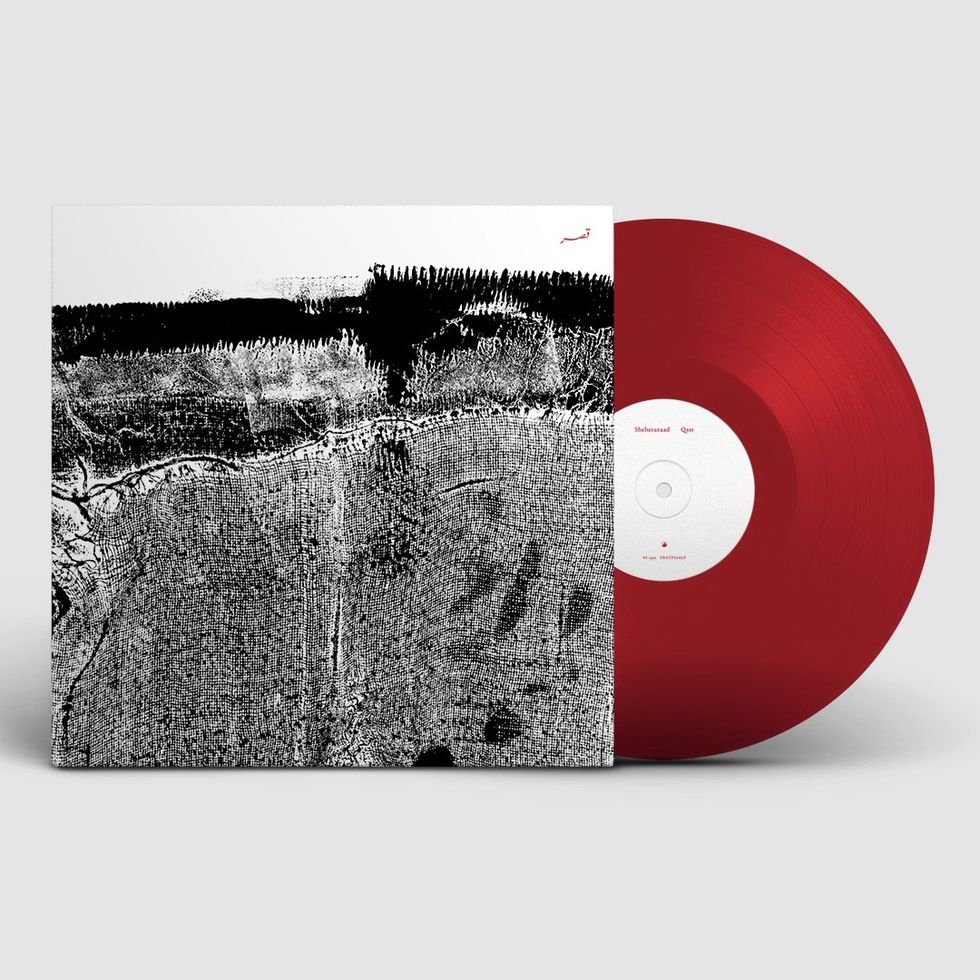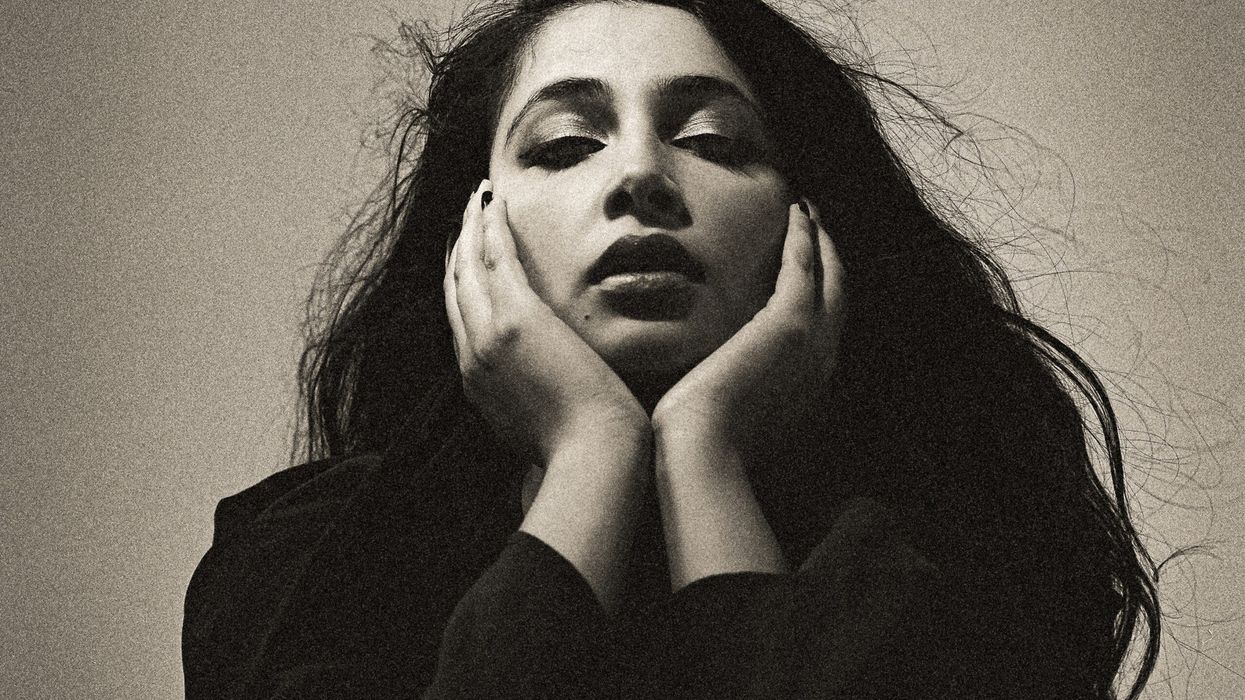WITH her deeply meaningful album Qasr, Sheherazaad beautifully explores displacement, the complexities of diaspora, the struggle to reclaim lost cultural roots, human experiences, and deep human emotions.
Grammy award winner Arooj Aftab has produced the genre transcending five-track LP that enables American composer and vocalist Sheherazaad to show off her unique talent. The songs have added a new chapter to a journey that began in a culturally rich childhood surrounded by music.
Eastern Eye caught up with one of the best kept secrets in music to discuss her journey, new LP Qasr, inspirations, and experience of working with hot right now artist Arooj Aftab.
What first connected you to music?
I was born to what I would describe as a ‘fanatically art-centred, Asian-American household’, and began ear training at home, with both my parents being band musicians and my grandmother a trailblazing Indian classical concert producer.
My mother is a very gifted singer, and I’m told I would hum along with her when she carried me in her arms as an infant. Her riaz floated around the household throughout my childhood. At home, I absorbed the life portfolios of Lata Mangeshkar and RD Burman, while beginning formal voice education in jazz and American songbooks from the age of six.
Tell us about your LP Qasr.
Qasr was engendered during a time of family estrangement, grief over a lost elder, and the racial polarisation of my country as I knew it. Arooj named the project, which I felt apt. Translating to ‘castle’ or ‘fortress’ in Urdu, Qasr indeed became a monument – like encapsulation of the real strains of displacement. The push and pull of diaspora, and the depravity of erasure and forgotten roots. It also became an intangible home, a personal fortress during a time of personal, political upheaval.How has your own experience as an expatriate influenced the creation of this album?
I feel geographic displacement is inherently an existential experience that births a fascinating, rich soundscape. Immigration and migration can create unbridled chaos. It is the gospel or objective truth being distorted and smashed to bits, a constant rebirthing and making anew. The songs are simply a channelling of homeland “auras” that I traverse physically and cognitively.
Tell us more about that.
I grew up knowing that I would always exist peripherally in terms of whatever was happening musicallyhere in the US. For me, eventually, this spawned a kind of musicality that veered into a space of rejection. I tend to want to blend a satirical, hallucinatory feel with elements that are very real and violent. It’s the soundscape of merging places and cultures, where the result is often abrasive, dramatic and illogical.

Can you share a specific moment or experience that directly inspired one of the tracks on Qasr?
Perhaps there was an aspiration to create a kind of neo-folklore that strips down mythology which has been imposed upon my ppeople namely the model minority trope. De-mythologising, so to speak. Dhund Lo Mujhe has threads of this, where you hear the speaker descending into a kind of madness with direct links to the so-called “model minority” idea, a mythology that gaslights people into insanity. The composition was incubated in south Asia.
Tell us about that.
I had ventured into small-town India during the height of the pandemic, as well as Covid denial, when my paternal grandfather was dying. The experience lent an auditory soundscape of total dysfunction. I liked oh sakhi as a binding lyrical phrase, because there’s this colloquial feel to it, adjacent to the hyper-contemporary quality within the other lyricism prevalent in the piece. The piece absorbed phrases in Bhojpuri and other Benarasi imagery, a gift of being immersed in Varanasi while composing.
In exploring your cultural roots, how did learning Arabic, Hindi, and Urdu influence and shape your artistic expression?
Learning Arabic was foundational to my compositional journey. Arabic came very easily to me; I felt I had an intrinsic and otherworldly connection with the language, till I realised that most Hindi and Urdu speakers do, because of shared linguistic lineage. Moreover, I became obsessed with classic singers like Fairuz, but also contemporary Arabic female composers with fresh sounds and full, embodied voices, many times that were on the deeper end in terms of vocal texture.
What about the Hindi/Urdu aspects?
Even though I come from a Hindi-speaking background, Urdu then became much more accessible since I had come from Arabic study. Encountering Urdu at an academic level was the true birth of my lyrical style, where certain words, phrases, or even sounds would leap off the page and seemingly demand full verses or pieces to be written around them. Hindi always feels grounding, like soil on the tongue. Though truth be told, I see the similarities of Hindi and Urdu constantly illuminated, such that it is a pain point for me that we consider them and the worlds they represent so ardently separate.
How have your diverse range of influences, from Lata Mangeshkar to jazz, come together in Qasr?
Composing is an extremely subconscious, sensorial act for me, where I play with scent, sight, taste, lighting, and silence among other things. So, my sensorial world, along with my lifetime of influences, all seep into the music in ways that go undetected or unnoticed by me till years later at times.
Reclaiming lost connections seems to be a theme in your work. How has this journey of self-discovery through music impacted your personal life and understanding of your cultural identity?
Prayer is deeply important to my compositional process. Spiritual learning and wisdom is most prioritized and revealing to me, within the music and otherwise. I consider music making strictly an act of worship and treat it accordingly. For me, it’s religious ritual and offering, ‘spiritual labour’ so to speak. I feel most embodied and connected to aancestralenergy when I compose and perform these pieces that are like portals for me.
What led you towards collaborating with Arooj Aftab on Qasr?
I would drop Arooj love notes for her music sporadically over the years. One day she had told me that she had heard some of the music I had released, and suggested she could produce the next project, to my utter surprise. Perhaps she saw alignment in terms of our positionality as experimental south Asian artists here in the US.
What was it like working with her?
She’s such a generous soul and I’m sure she saw scope to share her wisdom gleaned painstakingly over the years. The process of working with her was essentially feeling so seen and held, knowing that all the iterations would pass through her shared cultural understanding and raw brilliance.
Do you have a favourite track on the LP?
It’s hard to choose favourites among one’s own children as each one holds a unique place in your heart.
Who would you love to collaborate with?
A dream would be to keep collaborating with other experimental composers who are steeped in south Asian, Persian, or Arabic musical traditions.
How much does live performance mean to you?
Coming from the theatre world, live performance means everything to me. It’s where the musical act of total communion can be truly held in my view, where the music is equally fed by the audience, as they received it. Where music can come to life in new and unprecedented ways that digital capture cannot ever quite encapsulate. I believe live performance is primal and indigenous.
What inspires you creatively?
I find inspiration in diasporic daily existence, basically the small day-to-day details of immigrant life.
What music dominates your own playlist?
I have a playlist now called The Free City (Azaad Sheher) which is a collection of pieces that have hugely fed into my musicality. What’s the music master plan going forward, and how will you achieve it? Woman proposes, God disposes. So, no master plan as such. I hope to stay rooted in my compositional practice and keep gleaning new experiences in the ever-evolving realm of music technology, which I feel is crucial for one’s artistic voice, creative growth, and autonomy.




